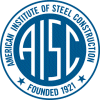The American Institute of Steel Construction (AISC) is working to bring that vision to reality by developing a three-step interoperability strategy to evaluate data exchanges and integrate structural steel information into buildingSMART's Industry Foundation Classes (IFC). IFC is an open and neutral data exchange format that covers multiple disciplines across the construction industry.
AISC has been at the forefront of advancing interoperability through open standards since adopting the CIMSteel Integration Standard (CIS/2) in 1998 as an open standard for the structural steel industry. Since then, however, the landscape of software interoperability and integration has changed dramatically and even after a decade of progress, the issue is not solved. In addition, CIS/2's "steel-only" format has meant that other solutions were needed as other disciplines began demanding data exchange.
These cumulative changes have led to AISC's new strategy to advance interoperability across the construction industry: assess and enhance data exchanges available today and integrate that knowledge into IFC, a common data schema that makes it possible to hold and exchange data between different proprietary software applications. Although IFC has yet to address some details of a building's life cycle, and does not yet cover the depth of data that CIS/2 encompasses, the IFC schema aspires to cover every aspect of design, procurement, manufacture and assembly, and operations and maintenance.
Acknowledging that raising IFC to the level required by the structural steel industry will take time, AISC has adopted a three-part strategy, outlined as follows:
- Short term: Ensure model data can be exchanged as needed by the structural steel industry, regardless of the nature of the exchange or format used
- Medium term: Promote IFC and make the format more accessible and understood by working with buildingSMART, other trade organizations, academia and subject experts.
- Long term: Facilitate the development and implementation of IFC to satisfy the needs of the structural steel industry.
This new strategy maintains AISC and the structural steel industry's leadership in interoperability and ensures that data related to structural steel can be exchanged up and down the supply chain and with other disciplines and trades. AISC holds the view that open standards will never be able to transfer every piece of data a user or client may want, or indeed that two software programs could exchange.
"A combination of open standard and proprietary enhancement will always be state of the art, but the key is to always be raising the quality of data exchanged within the open format," commented Chris Moor, AISC director of industry initiatives. "To that end, this overall strategy feeds itself: The short term strategy is an ongoing effort and takes advantage of the myriad of exchanges available, now or in the future, documenting them and learning from them - what data is exchanged and why. This information then forms the basis of long term goals to develop and implement IFC to a very high standard, raising the bar once more for open standards."
Added Deke Smith, executive director of the buildingSMART alliance, "I look at AISC as the gold standard for associations. AISC is implementing the profound changes necessary to transform the industry as a service to the constituents they represent. If all the market sectors had organizations representing them with this level of understanding and dedication to getting the job of interoperability done we would see a far more effective construction industry in the United States, one that was more competitive internationally."
More information about the evolution of interoperability and AISC's novel approach to moving it forward can be found in the Fall 2011 issue of the Journal of Building Information Modeling (JBIM), available for free downloading at http://www.wbdg.org/references/jbim.php. A copy of the article is also available on AISC's website, here. BD+C
Related Stories
AEC Tech | Jan 19, 2023
Data-informed design, with Josh Fritz of LEO A DALY
Joshua Fritz, Leo A Daly's first Data Scientist, discusses how information analysis can improve building project outcomes.
Multifamily Housing | Jan 19, 2023
Chicago multifamily high-rise inspired by industrial infrastructure and L tracks
The recently unveiled design of The Row Fulton Market, a new Chicago high-rise residential building, draws inspiration from industrial infrastructure and L tracks in the historic Fulton Market District neighborhood. The 43-story, 300-unit rental property is in the city’s former meatpacking district, and its glass-and-steel façade reflects the arched support beams of the L tracks.
Urban Planning | Jan 18, 2023
David Adjaye unveils master plan for Cleveland’s Cuyahoga Riverfront
Real estate developer Bedrock and the city of Cleveland recently unveiled a comprehensive Cuyahoga Riverfront master plan that will transform the riverfront. The 15-to-20-year vision will redevelop Tower City Center, and prioritize accessibility, equity, sustainability, and resilience.
Museums | Jan 18, 2023
Building memory: Why interpretive centers matter in an era of social change
The last few years have borne witness to some of the most rapid cultural shifts in our nation’s long history. If the experience has taught us anything, it is that we must find a way to keep our history in view, while also putting it in perspective.
ProConnect Events | Jan 17, 2023
3 ProConnect Single Family events for Home Builders and Product Manufacturers set for 2023
SGC Horizon, parent company of ProBuilder, will present 3 ProConnect Single Family Events this year. At ProConnect Single Family, Home Builders meet in confidential 20-minute sessions with Building Product Manufacturers to discuss upcoming projects, learn about new products, and discover practical solutions to technical problems.
University Buildings | Jan 17, 2023
Texas Christian University breaks ground on medical school for Dallas-Fort Worth region
Texas Christian University (TCU) has broken ground on the Anne Burnett Marion School of Medicine, which aims to help meet the expanding medical needs of the growing Dallas-Fort Worth region.
Green | Jan 17, 2023
Top 10 U.S. states for green building in 2022
The U.S. Green Building Council (USGBC) released its annual ranking of U.S. states leading the way on green building, with Massachusetts topping the list. The USGBC ranking is based on LEED-certified gross square footage per capita over the past year.
Libraries | Jan 13, 2023
One of the world’s largest new libraries opens in Shanghai
Designed by Schmidt Hammer Lassen Architects, Shanghai Library East covers more than 1.2 million sf, 80% of it dedicated to community activity.
Religious Facilities | Jan 9, 2023
Santiago Calatrava-designed St. Nicholas Greek Orthodox Church opens in New York
In December, New York saw the reopening of the new St. Nicholas Greek Orthodox Church and National Shrine—the only religious structure destroyed on 9/11. Renowned architect and engineer Santiago Calatrava designed St. Nicholas Church to address the traditional Greek Orthodox liturgy while honoring the Church’s connection with the World Trade Center Memorial site.
Government Buildings | Jan 9, 2023
Blackstone, Starwood among real estate giants urging President Biden to repurpose unused federal office space for housing
The Real Estate Roundtable, a group including major real estate firms such as Brookfield Properties, Blackstone, Empire State Realty Trust, Starwood Capital, as well as multiple major banks and CRE professional organizations, recently sent a letter to President Joe Biden on the implications of remote work within the federal government.

















